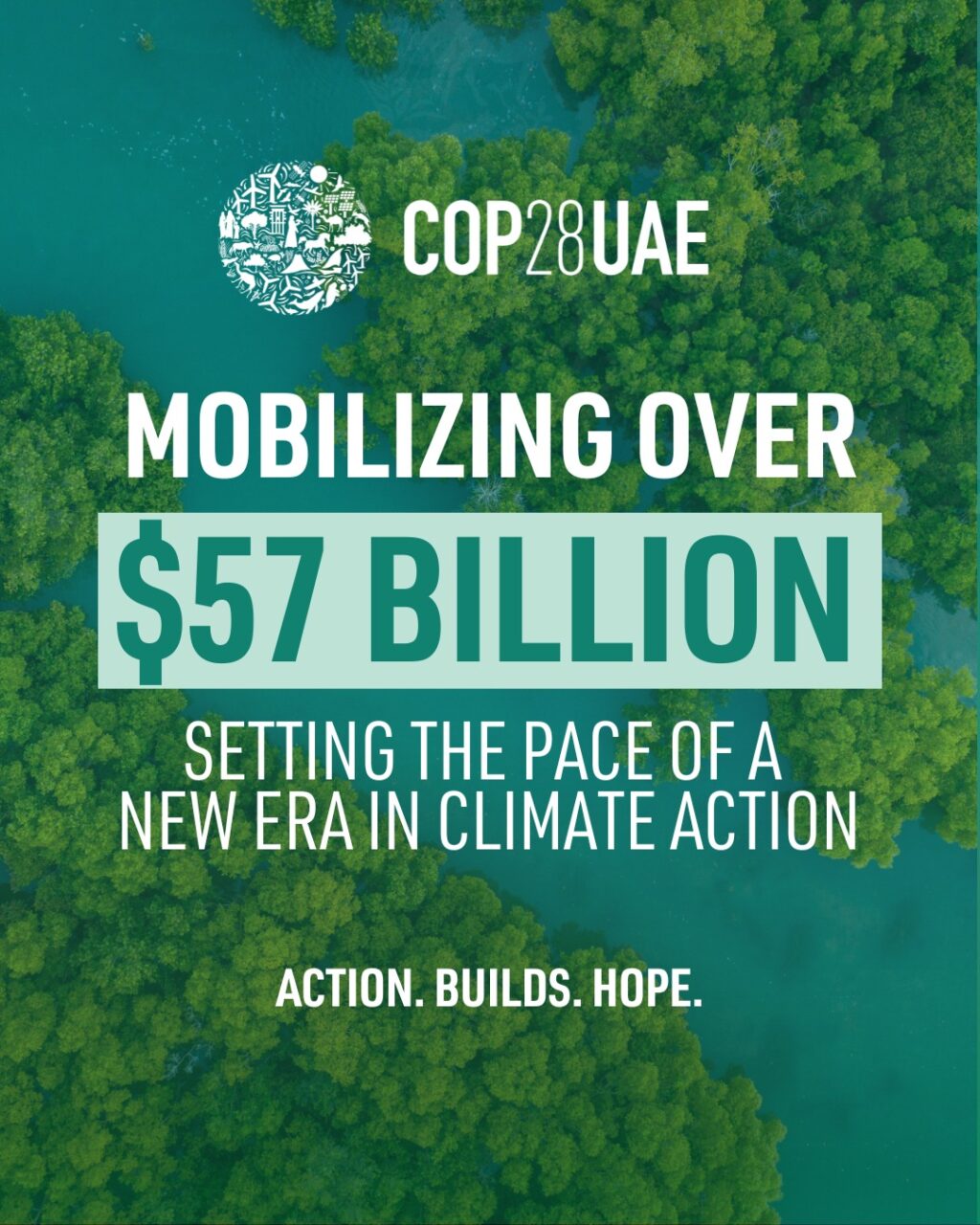The UN climate change meetings are widely known as highly political with interests and proposals of various interest groups and countries, both on the table and behind the doors. As funding has been massively channelised into various funds over the first few days of the negotiations in the land of the oil-rich country, it’s rationale to be mindful of what’s offered and what’s not
COP28 host, the UAE, has just summed up the massive funding that has flown into various funds, both existing and newly set up ones, which has stood so far at US $57 billion. This is huge and unprecedented in the modern history of climate negotiations to have such massive funding having been poured into climate-related funds. As noted by the host itself, this has been poured in across the entire climate agenda, including finance, health, food, nature, and energy.
And the first and foremost pledge made is about climate impact response, or what is widely known in climate negotiations as “loss and damage”.
On the first day of the negotiations, COP28 President Dr. Sultan Al Jaber on Thursday gaveled this first major milestone of COP28, delivering a historic agreement to operationalize the Loss and Damage Fund with the host country’s startup pledge worth US $100 million. More monetary pledges from other major countries then followed, prompting the fund to have been able to raise over US $700 million, as of Tuesday, the fifth day of this round of climate negotiations.
Dr. Al Jaber said upon the announcement that; “the hard work of many people over many years, has been delivered in Dubai, the speed at which the world came together, to get this fund operationalized within one year since Parties agreed to it in Sharm El Sheikh is unprecedented.”
Afterwards, more funding was poured into various funds to support various climate-related agendas; from food to health to nature and energy.
But what’s still missing from the efforts led by the UAE, the oil-rich country, is the attempt to address the phase-out of fossil fuels, the most desired and ambitious goal to fight climate change so as to keep everyone on earth safe from it. The latest revelation by the Guardian about his views on the matter is indeed concerning.
As revealed by the Guardian on Sunday, the COP28 president had said “there is no science” indicating that a phase-out of fossil fuels is needed to restrict global heating to 1.5C during an event before the COP, where he exchanged views over the matter with some attendances. He also said that a phase-out of fossil fuels would not allow sustainable development “unless you want to take the world back into caves” while exchanging views and asking for some recommendations from them.
The views of the COP28 president just go against the available science, which stresses the need to cut GHG emissions deeply and rapidly. This is despite the fact that he had refered to 1.5C at the COP as his “north star”.
The UN’s available information including that from the UN-designated climate science body, IPCC (Intergovernmental Panel on Climate Change), has made this clear that to limit or keep global warming to no more than 1.5C, GHG emissions need to be reduced by 45% by 2030 and reach net zero by 2050. The International Energy Agency’s latest net zero emissions scenario also noted there cannot be any new fossil fuel development, according to Climate Analytics, which the Guardian quoted.
Prof. Sir. David King, the chair of the Climate Crisis Advisory Group and a former UK chief scientific adviser, who was also quoted by the Guardian, said; “It’s undeniable that to limit global warming to 1.5C we must all rapidly reduce carbon emissions and phase-out the use of fossil fuels by 2035 at the latest.” He himself said in response to Dr. Al Jabor’s remarks that it is “incredibly concerning” and “surprising” (to hear the Cop28 president defend the use of fossil fuels).
Following the revelation, Dr. Al Jaber quickly held a press conference the day after to clear the issue, an attempt seen as trying to defend himself. As reported by the Guardian, he said; “I respect the science in everything I do. I have repeatedly said that it is the science that has guided the principles or strategy as Cop28 president. We have always built everything, every step of the way, on the science, on the facts.”
He also added; “I have incredible respect for Mary Robinson (The chair of the Elders group and a former UN special envoy for climate change he heatedly exchanged views with at the Nov 21 event). I have said over and over the phase-down and the phase-out of fossil fuel is inevitable. In fact, it is essential.”
Still, what is absent from his statement is what he said at the event afterwards that said; “But we need to be real serious and pragmatic about it.”
Dr. Al Jaber is also the chief executive of the United Arab Emirates’ state oil company, Adnoc, and he is a controversial figure in the first place when taking the president role of this COP. His actions afterwards are no less suspicious when the massive funding has been channelised to support the efforts to cope with climate change since the very first days of the negotiations.
It’s widely known that COPs are full of interests and motivations, and it’s an international politics that unequal power in negotiations is often played out. As the COP president, Dr. Al Jaber has to prove himself that he sticks to science and gets everyone out of the disagreement between such ambiguous phases between “phase-out” and “phase-down” of fossil fuels.
COP26 in Glasgow showed once how strong power can turn the tide when the word “phase-out” of fossil fuels was toned down to merely “phase-down” at the end of the day. COP28 must show that only the strong will of all humanity to survive climate change will get over any suspicious moves and massive money cannot distract the talks or prompt ones to get away from their responsibilities.
The international community must at the same time keep them on task. The question only remains; whether or not they keep themselves focused or pay enough attention to what ultimately needs to be done.
(As of Dec 5, no head of state of Thailand has shown up in Dubai to participate in the talks.)
Indie • in-depth online news agency
to “bridge the gap” and “connect the dots” with critical and constructive minds on development and environmental policies in Thailand and the Mekong region; to deliver meaningful messages and create the big picture critical to public understanding and decision-making, thus truly being the public’s critical voice


